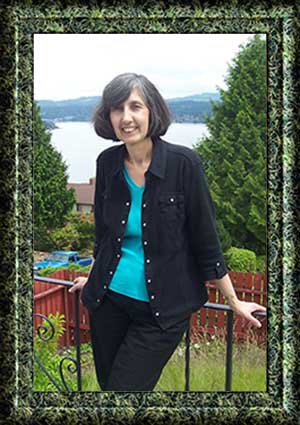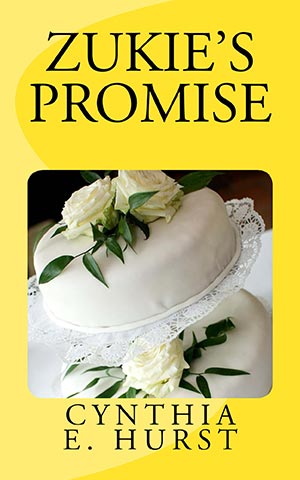Joining me today to talk about the 7th book in her Zukie Merlino Mysteries is author Cynthia E. Hurst. Thank you, Cynthia, for taking the time to chat to me. Please sit down, get comfortable and let’s begin.

About Cynthia E. Hurst
Cynthia E. Hurst is the author of the R&P Labs Mysteries series, featuring Rob, Phil, Ellis, Virginia and Mitch — five scientists with a talent for solving murders matched only by their ability to stumble over them in the first place.
The Zukie Merlino mysteries are a spin-off of these. The main character first appeared in the R&P Labs short story “Halfbaked” and promptly insisted on being featured in her own series of full-length novels.
Like her characters, Cynthia grew up in Seattle, and then graduated from the University of Oregon with a journalism degree. She has been a reporter, copy editor and columnist at various newspapers, and also spent five years as a housing officer for British military families. She and her husband have two sons, two grandchildren and a grandcat, and divide their time between Seattle and the English Cotswolds.
What’s the name of your new book?
Zukie’s Promise (Zukie Merlino Mysteries 7)
Tell us a bit about your book
Zukie Merlino’s daughter Carol is (finally) getting married, and Zukie has been told in no uncertain terms that her role at the wedding is to show up, shut up and keep smiling. That’s hard enough, but when a body turns up at the rehearsal, Zukie faces an even tougher challenge. The wedding’s in two days, the bride and groom are suspected of murder and everyone involved seems to be hiding a secret. But Zukie has promised herself nothing will ruin Carol’s wedding, and Zukie always keeps her promises, no matter whose toes she has to step on along the way.

Give us an insight into your main character. What makes them unique?
I’m very fond of Zukie Merlino. She’s a widow in her late 50s, so she’s learned a lot about life, and although she’s not well-educated or sophisticated, she’s intelligent, curious and perceptive. She has a quick temper and is totally lacking in tact and diplomacy, but she’s also got a heart of gold.
Have you always liked to write?
I have loved to write for as long as I can remember. However, reality kicked in fairly early and I knew I probably wouldn’t make a living writing fiction, so I went with Plan B and earned a journalism degree so I could still write AND rely on a paycheck. I worked on newspapers and magazines in the Pacific Northwest and the UK and didn’t really turn to fiction until I took an early retirement in 2010. I soon found I had been right about not earning loads of money writing fiction, but I love it.
What writing advice do you have for aspiring authors?
I think you have to be a reader in order to write. Not just for pleasure, but to observe how other authors craft their books. The other thing is that you must know the basics of spelling, punctuation and grammar before you try to write anything, and certainly before you try to publish anything. If you don’t, it’s like trying to build a house from the roof downward. I don’t know how many aspiring authors’ works I have jettisoned because they couldn’t construct a simple sentence and hadn’t bothered to do even a basic editing job.
If you didn’t like writing books, or weren’t any good at it, what would you like to do for a living?
I’ve always liked history and once did volunteer work in a museum, which I enjoyed. Bringing the past alive is a fascinating job, so I might pursue that.
Is there a certain type of scene that’s harder for you to write than others?
I tend to be a little squeamish about writing sex scenes, so they’re normally the fade to black type. My characters have sex; they just don’t have anyone watching them and describing it. On the other hand, I like writing action scenes, even though I end up re-writing them half a dozen times before I’m satisfied.
How long does it usually take you to write the first draft of a book?
About two months for the first draft and then a couple of weeks tweaking and editing. I tend to check for typos as I go, a habit from my days as a journalist, so it’s more a case of smoothing out awkward sentences or adding more description before publishing. I also have a beta reader who does an excellent job of weeding out my British terminology. I’ve lived in the UK for more than 30 years and British phrases tend to sneak into my writing, but my characters are American, so they have to use appropriate language.
How has your environment or upbringing impacted your writing?
Both my series are set in my hometown of Seattle, so there are a lot of local references and locations. (I once had someone buy a book on the spot after he learned one of the scenes took place about 100 yards from where we were.) The idea for the R&P series came from the laboratory my parents worked in and Zukie and Lou come from my Italian-American background.
Describe what your ideal writing space looks like.
My ideal writing space would be a private office in Seattle overlooking Lake Washington or Puget Sound, furnished with a solid wall of books, a comfy chair to sit and write in and an endless supply of coffee. Reality is somewhat different.
Why should a potential reader buy your book(s)?
I think my books appeal to a broad spectrum of readers, basically anyone who likes a light-hearted, fast-paced whodunnit with interesting characters and a lot of humor. Besides, they’re cheap.
What’s the strangest thing you have ever had to research for your book?
How to make surgical dressings out of sphagnum moss, a big part of the plot in my first R&P book, ‘Mossfire’.
What’s an interesting fact about your book?
In my R&P Labs series, many of the staff’s projects are ones actually undertaken by the real lab that inspired the books.
Why did you choose to write in your genre? If you write in more than one, how do you balance them?
I have loved mysteries ever since my parents inherited several mystery anthologies from a friend. I was about 11 or 12 at the time and read my way through all of them – the complete Sherlock Holmes canon, Raymond Chandler, Ellery Queen, Ngaio Marsh, Agatha Christie, Rex Stout, Dorothy L. Sayers and many more. I was hooked and I still prefer a mystery to any other genre. In fact, one reason I started writing was that I couldn’t find any new books I liked. The hard-boiled ones were too graphic for my taste and the cozy mysteries were too insipid.
What advice would you give to your younger self?
When one door closes, another opens.
Of all the characters you have created, which is your favourite and why?
Mitch Okada in the R&P Labs books has to be my favorite. He was originally intended to be a minor character, someone who wouldn’t fit the stereotype of a quiet, studious Japanese-American, but he promptly elbowed his way into the spotlight and won’t leave. Mitch is described by another character as “a bad boy with a lot of good qualities,” which pretty much sums him up. He’s great fun to write.
Are your characters based on real people, are they imaginary or a combination of both?
The two main characters in my Zukie books are based on one of my Italian aunts and a male second cousin who moved in with her after they were both widowed. Like Zukie and Lou, they had a noisy, confrontational, platonic relationship, but they were there for each other when needed.
My R&P Labs characters are imaginary but the setting isn’t. My parents were scientists and for several years they both worked at a small, independent, financially insecure lab, which meant I spent a lot of time there on weekends and during school breaks. When I started my first mystery, I thought a lab like that would make a good setting and create potential for plots. Unfortunately I have no scientific ability myself, but I have been around scientists all my life, so I hope the R&P crew are believable characters.
Who are your favourite authors, and why?
I’d have to say Rex Stout and Carl Hiaasen. Stout’s Nero Wolfe/Archie Goodwin books are traditional mysteries and Hiaasen’s novels are modern and more anarchic, but they both make me laugh while delivering a good story and memorable characters. For sheer humor, I like Terry Pratchett, especially the Sam Vimes novels. Recently, I’ve also been reading my way through Laurie R. King’s Holmes/Russell books, which show Sherlock Holmes in an entirely different light.
What’s the best thing about being an indie author?
Having complete control over my content. I know a traditionally published author whose books sell very well, and yet she had to argue with her publisher to be allowed to kill off a character who richly deserved it. On the other hand, if things go wrong, there’s no one to blame but myself.
Where can readers go to discover more about you and your books?
Facebook | Amazon Author Page
Available formats: ebook and paperback
10



I love it! I immediately had to look up what “sphagnum moss” was. Mysteries aren’t normally my genre of interest, but Zukie sounds interesting and like a lot of fun. Thank you for an enjoyable interview. Good luck, Cynthia!